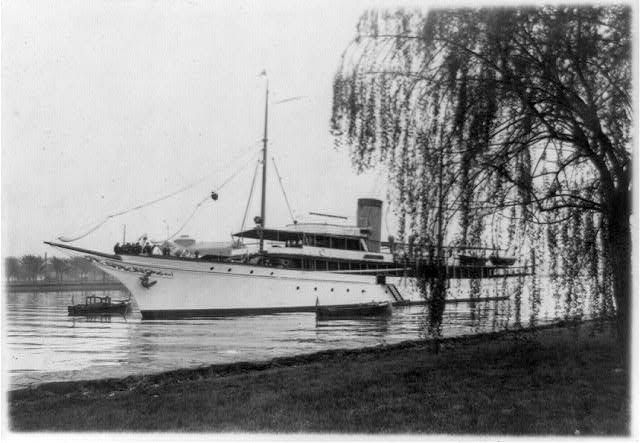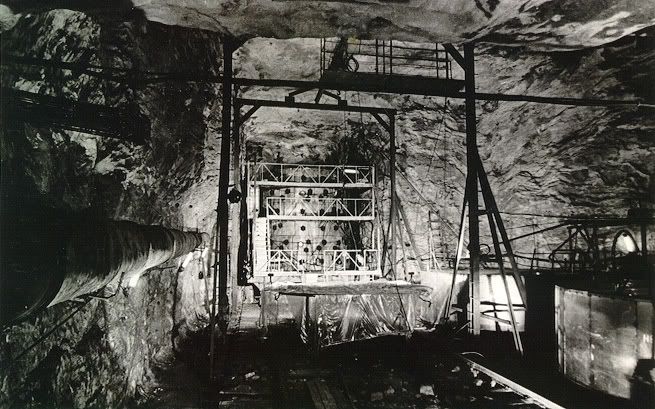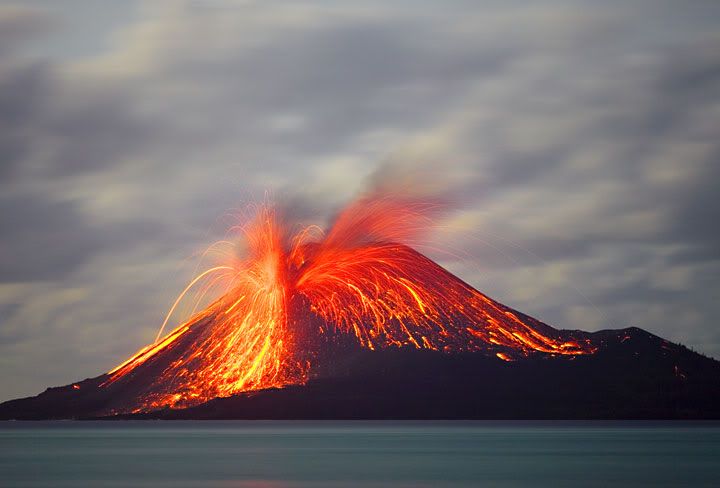Lush vegetation broken by stretches of broken lava; blue skies that drizzled ash; a magnificent beach with a thread of molten lava visible in the high, far distance – these were the disjointed impressions going through Makhearne’s mind as they stepped ashore on Nemor’s mysterious island. Its location was another surprise; instead of being hidden away in an untraveled part of the sea the island was squarely between the giants of Sumatra and Java, in the middle of the heavily-traveled Sunda Strait. Though there were no villages on the island, and no permanent residents aside from Nemor and the remnants of his crew, there were plenty of fire pits and bits of debris to show it had been a popular stopping place for local fishermen. No-one was visiting today, however: the high, twisted cone would have given away the island’s volcanic origin even if the tip of the spire had not been drooling a long, orange thread of lava, even if quakes like Satan’s kettledrums had not rattled the ground. On occasion, rocks and boulders came crashing down out of the sky, having been hurled aloft by gassy eruptions in the central crater.
“No-one in their right mind would be here, now,” Makhearne muttered. He reached forward and clasped Nemor’s shoulder, half-turning the older man and bringing the party to a halt on a trail that was no wider than single-file. “Look here, Nemor, we can’t stay here! This place is going to come down around our ears, and sooner than later. Let’s go steam around the islands for a week or so – we can come back then and see if the volcano has quieted down some.”
Nemor shook his head. “You don’t know these waters, Donneval. Krakatau is nothing – there are a hundred volcanic islands within a few day’s sail from here. The island is kicking up worse than when I left, yes – Feric can tell you it was calmer then. The volcano is going to vent a little, that’s all, and the flows are all on the other side of the island.”
“We need to go,” Makhearne insisted. Nemor just turned and kept walking; after an awkward moment, Makhearne trudged after him, swearing under his breath. The elevators were not far up the path, and were cleverly concealed. Nemor had explained that the cove where
Wanderer lay at anchor was not near the underwater tunnel that led to
Argonauta’s cave, and all the elevators connected to that cavern.
After the heat of the day and the thick, stifling, windless jungle along the trail, the cool, slightly clammy air in the elevator was a welcome, almost shocking, relief. They rode down in silence, and when the doors opened the interior of the cavern was at first too dim for their sun-dazzled eyes to make out any details. They emerged onto a shelf of rock, a natural overlook of the cavern below, and as their eyes adjusted they began to take in the details of the place. Directly below was a cove with no visible inlet, though a glow at the right-hand end suggested an opening into sunlit water in that direction.
Argonauta lay against a stone wharf nearly beneath their feet, and despite her bulk the cove was large enough for two or even three ships her size. The cove was ringed with a walkway, with doors opening onto what Makhearne presumed were warehouses and workshops. Overhead the dark gray rock soared up to disappear behind a haze of lights. Directly overhead were two large cranes, whose cables disappeared into
Argonauta’s open hull. Stepping to the rail and looking down, Makhearne could see that the sub was in no way ready for sea; open hatches in the deck sprouted bundles of cables that ran off down the walkway to disappear into large cabinets of equipment, and hull plates had been unriveted so that pieces of machinery could be removed. And past that…
Captain Nemor’s apparatus, spread across and into the rock at the far end of the Argonauta’s volcano lair
Nemor pulled his datapad from a coat pocket and pecked at it until work lights blossomed into life across the wall at the end of the cove. Spidery tendrils of girders and cables snaked across and plunged into the rock, the stark shadows making it difficult to resolve any details. As Nemor continued to work the pad, operating lights began to glow on the cabinets, firefly swarms of golds, reds and greens, and the sound of dynamos filled the cavern with a keening rumble. Still holding the pad, Nemor stepped off down the stairs to the walkway below, and perforce the rest of the party followed. “It may be some time before any contact is achieved,” he said. “Jusuf! Robert! Escort our guests to the dining hall and see that they may refresh themselves. I will call for you when you are needed.”
Several hours passed. The food had been simple but good – a seafood bisque and salads of unusual but tasty greens, but a full stomach in the cool air of the cave made them all sleepy. Makhearne was awakened from a deep and troubled sleep by a voice saying, “Honored one! A thousand pardons, honored one, but the Master wishes to speak with you!” The crewman had the sense not to have tried to shake the older man awake, and he waited patiently as Makhearne and the rest of the party gathered their wits and roused themselves. A quick check of his internal clock showed it was a little after 2pm.
Out in the main area of the cave he noticed that the water moved in oily, slopping swells, and the surface appeared to be dusted with powdered rock from the cavern roof, both signs that the seismic activity had not died down. The hum of dynamos, fans and other equipment was much louder now, and as they approached the equipment sprawled across the rock face he saw a slow, twining swirl of electrical sparks. As they got closer the air took on the acrid tang of ozone, the heat radiating from the rock face became palpable, and Makhearne began to wonder again if they should not abandon the project and return later. If was obvious that Nemor had built in no safety precautions whatsoever, and to be within arms reach of an active volcano…
His thoughts were derailed by a smiling Nemor, a man almost giddy with excitement and relief. “I’ve reached them. They want us to boost our signal so they can open a portal. We’re going home, Donneval! Going home!”
Makhearne and Ronsend scanned the message slips. Nemor’s machine was able to send coded pulses akin to telegraphic code, but could not support voice or pictures. “I don’t recognize any names – in fact there are almost no names listed here,” Makhearne said after a long moment of study. “Ask them to get Tamon Morrial. I have some questions to ask him.” Seconds later the reply clattered back: ‘Morrial not available. Many changes here. What do you need.’
They argued, then, Makhearne in favor of caution, Nemor wanting to boost the signal immediately, and Ronsend wavering and undecided. At last, Nemor broke the deadlock. “I’m going to go to full power, Donneval. There are no other time-binding civilizations – this cannot be anyone but our people!”
“Before you do,” Makhearne said, “arm your men and post them under cover.” Nemor attempted to argue but Makhearne bore him down. “They say there have been a lot of changes, and no-one we know is available. I don’t want to be dragged off to some bartop court-martial because of Kierianne’s doings.” That brought the older man up short, and he issued orders for the arms lockers to be opened.
Then the device was pushed to full power, generating a single tone instead of message pulses. After a few moments a hazy patch formed on the rock face, and Nemor began shutting down his equipment. The patch solidified and enlarged, opening until it became a tube apparently extending back into what had been solid rock. It began to glow, then like a picture coming into focus settled into a view of a corridor floored with something like linoleum, lit by overhead fluorescent lights, walls painted a pale institutional green. It was absolutely unexceptional as a corridor, except that the three Knights Temporal knew it looked nothing like any portal they had ever seen used.
A man walked down the corridor, trailed by a squad of soldiers. The one in the lead wore high, glossy black boots, a complicated-looking kilt or baggy pantaloons tucked into the boots, a beribboned tunic of khaki hue with a high, tight collar, and atop it all an absurdly high peaked cap. The soldiers wore the same khaki tunic with a sandy kilt, bare legs and heavy tan ankle-high boots; their caps were of the flat, foldable design the Scots called a Glengarry cap, without the trailing ribbons. Their movements were practiced and their arms looked to be well cared for; from the brief observation Makhearne thought they were likely bolt-action, single-fire weapons. If it dropped in the pot – which seemed likelier now than it had a few moments ago – then the semi-automatic weapons in the hands of Nemor’s men should prove an unpleasant surprise.
“Stop where you are,” Nemor rapped, and the men complied, though several soldiers fanned out to the sides of the officer. That gentleman raised both hands, smiled and rattled off some orders in a liquid tongue. Then he spoke in heavily-accented but understandable English. “My apologies. My men do not speak Anglic. I have told them to remain still. We shall talk, yes? I have come to take you home. On behalf of the Senate and People of Rome, I greet you.” Even as he talked his eyes roamed the cavern, widening when he saw the bulk of the submarine at the wharf.
Just then another tremor brought rock dust drifting down from the ceiling; that, as much as anything else that had happened, seemed to make the foreign officer uneasy. Makhearne looked at Nemor, who refused to meet his eyes, then at Ronsend. “That language is Vlach,” the younger man whispered.
“What?”
“Vlach – Romanian. I don’t recognize the uniforms, though.”
“That’s because no-one’s ever made contact with another time-binding civilization before,” Makhearne said absently. “Lucky us... Whoever these people are, they aren’t ours. Now the problem is to close the portal before more of them come through.”
“Please come down and let us talk,” the officer called.
“Give us a moment,” Nemor replied, then dropped his voice to a whisper. “Donneval, take your party and go. I can’t break their lock by restarting my engines, and more of those people are going to come through any moment. I’m not surrendering, and they have to be slavering at the thought of getting to interrogate other people who know how to hop timelines. My men and I can hold them for a while, and when they get through…
Argonauta has a Swedish Imperial warhead I’ve been keeping as a scuttling charge.”
“What’ll that do – bring down the cavern roof?”
“It’s about a 40 kiloton nuclear device. It’ll crack the shield and let seawater into the volcano magma chamber, in addition to what happens when a nuke goes off in that corridor. I think we’ll mess them up pretty well – but you and your people need to be far away.” He stilled Makhearne’s objections with a motion of his hand. “My men – my responsibility. Now go!”
As Makhearne, Ronsend and his wife ran for the stairs, they heard Nemor say, “We’ve decided you need to go back in that tube, turn it off and never come back.” Then there were shots, including some that rang off metal and stone uncomfortably close to the elevator shaft, the buzzing purr of Nemor’s Uzi’s and the hammering of rounds punching through the equipment cabinets. As the elevator door closed, Makhearne had a last second’s look at heaps of bodies in the portal tube.
“Once we hit the surface, Feric, take Ann and get her to the yacht as fast as you can go – carry her, if you must, but waste not a second. We don’t know if they’re able to open another portal. I’ll disable the elevator and follow you. Once you’re on the yacht, make sure all is ready for immediate departure.” A tremor rocked the elevator car against its supports and the lights flickered but stayed on. “If I’m not there within fifteen minutes, go.” Makhearne rode over Ronsend’s protests without stopping. “Nemor’s going to crack the shield and let the ocean into the magma chamber. I don’t know how big the explosion will be but I’m thinking megaton-range.
Wanderer will need to be a long way away to be safe, so don’t argue with me.”
Krakatau vents lava from one of its three volcanic cones
The doors opened and a blast of heat rolled in. Choking on traces of gas and dust, Ronsend and his wife raced off down the path. Makearne spared a glance upward and was transfixed – as purely terrified as he had ever been in his life. The volcano was in full eruption, threads of lava drooling over the lip like vivid red and orange runnels of candle wax. Far off, the jungle was burning; overhead, the caldera was still blasting rock and ash into the sky. He swore a silent oath to Loki the Trickster, then opened the elevator panel and ripped out all the wiring he could manage. That done, and with his shirt already soaked through, he set off for the harbor.
The ground was vibrating continuously now, making the simple act of picking his feet up and putting them down again a delicate act of dance. Fortunately the path was straight and nearly smooth; unfortunately, the tremors had brought down trees across it. He was about half-way to the yacht, he thought, when his phone chimed. One nice thing about implants is that they can be answered without using hands, and since he was busy hoisting himself over a tree trunk that feature made it possible for him to pick up the call anyway. It was Nemor. “Some of them got out through an elevator, so keep your eyes open. They tried gas grenades but lobbed them into the water; the fans are coping.”
“It’s bad up here. The volcano is blowing lava.”
“We can hold out a little longer here. Get off – get away!”
He ran. Ahead he could see the glitter of water through the foliage, at his heel there was the telltale puff of dust from a missed shot. By reflex he redoubled his speed and hurtled around a curve, throwing himself over and down behind a downed tree. He heard excited voices, though he could not make out what they were saying. Vlach – Wallach – he mused, while his hands fumbled the machine pistol from his belt and took the safety off. Survivors of the old Empire, heirs to a new one? That ‘On behalf of the Senate and People of Rome,’ had been altogether too polished…
His pursuers had been in a hurry to keep up, and that meant they had to plunge ahead without wondering if he lay in ambush. His first burst of bullets brought two of the soldiers down and sent the rest diving for cover, but he did not stay to see what happened next. A mad scramble down a steep pitch brought him to the beach, where
Wanderer lay closer to the shore than he remembered. Without breaking stride he was across the sand and headlong into the water, abandoning shoes and gun in mid-leap. A burr of bullets overhead meant someone was manning the yacht’s machine guns and told that his pursuers were willing to trade casualties for his capture. He struck out strongly, but the filthy air and the exertions of the run had sapped his strength. Before he could reach the yacht he saw the spume from the thrashing propellers, and felt as much as saw the rope land in the water alongside. Makhearne had only a moment to secure the rope under his arms before the combined power of engines and turbine lifted the ship and hurled it like a rocket out of the cove.
A few hard pulls brought him dripping to the deck, quivering from the hard-pounding machinery, and face to face with the captain. “The boiler’s on the red-line, sir – but the young master here said it was utmost urgent.”
“Quite right, Captain Moffett – we want all possible speed, now.”
“What course, sir?”
“Any – so long is it is a straight line away from
that.” He hooked a thumb at the volcanic cone as he spoke and Moffett nodded before hurrying below to speak with the engineer. “Feric – below, in my kit I have a few pair of special sunglasses. Could you fetch them for me please – and perhaps something dry to wear?” Then he lifted his voice. “Everyone – the volcano may explode at any moment. When it does the light and sound are going to be impossibly bright and loud. You must not look back – you could be blinded. And when you see the bright light, close your eyes and cover your ears!”
They had another half hour of grace before his phone chimed again. “Donneval – this is it.”
“Everyone – Look forward! Close your eyes and cover your ears!” Slipping on the protective glasses, he turned to look. For just a second he thought he saw the mountain bulge… and then there was light, white as the heart of the sun, and the tall pillar of fire tipped its wide-brimmed hat above the wide, wide sea.





